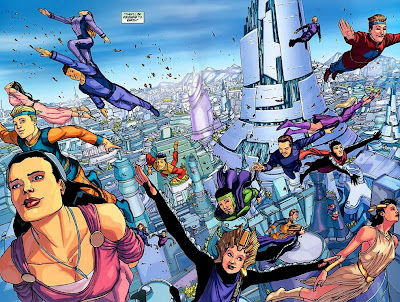 "The Question" in Detective Comics #859 by Greg Rucka and Cully Hamner
"The Question" in Detective Comics #859 by Greg Rucka and Cully HamnerRenee Montoya, aka The Question, is on a mission to root out a network of human traffickers coming through Gotham City. The problem, as she's starting to see, is that the network is much more complicated than she expected. In fact, the trafficking operations seems to take place all over the world and involve many different agents.
Many refer to this phenomenon as "The Globalization of Crime." Globalization, basically the process by which national economies become integrated into a global economy through various mechanisms--trade, foreign direct investment, spread of technology, etc.--brings about several benefits. Supporters of free trade, for instance, argue that globalization heralds economic prosperity, especially for developing nations. Such economies would realize the benefits of trade, the free and unfettered flow of information, and might even see improvements in civil liberties.
Others argue, however, that the minimization of trade restrictions actually brings about other problems. For example, it might make the transportation of illicit goods across national borders that much easier. According to the UN Office of Drugs and Crime, the production and spread of synthetic drugs has been rising rapidly for years and, as of October 2009, income from the drug trade has hit $320 billion.
Here is one author talking about the connection to globalization:
The ease with which these criminals dodge regulations is actually even mentioned in the comic. See?

So what can be done about this? The article mentions that we need "greater international cooperation, more harmonized legislation and increased sharing of intelligence." The UN argues that we should focus on promoting health, justice and security across the world to mitigate the regional economic conditions that might foster drug and human trafficking.
This all sounds very complicated. Too bad the real world doesn't have a global network of bat-related crime fighters (or Liam Neeson)!

Many refer to this phenomenon as "The Globalization of Crime." Globalization, basically the process by which national economies become integrated into a global economy through various mechanisms--trade, foreign direct investment, spread of technology, etc.--brings about several benefits. Supporters of free trade, for instance, argue that globalization heralds economic prosperity, especially for developing nations. Such economies would realize the benefits of trade, the free and unfettered flow of information, and might even see improvements in civil liberties.
Others argue, however, that the minimization of trade restrictions actually brings about other problems. For example, it might make the transportation of illicit goods across national borders that much easier. According to the UN Office of Drugs and Crime, the production and spread of synthetic drugs has been rising rapidly for years and, as of October 2009, income from the drug trade has hit $320 billion.
Here is one author talking about the connection to globalization:
International organized crime has globalized its activities for the same reasons as legitimate multinational corporations. Just as multinational corporations establish branches around the world to take advantage of attractive labor or raw material markets, so do illicit businesses. Furthermore, international businesses, both legitimate and illicit, also establish facilities worldwide for production, marketing, and distribution needs. Illicit enterprises are able to expand geographically to take advantage of these new economic circumstances thanks to the communications and international transportation revolution.
[...]
Globalization is coupled with an ideology of free markets and free trade and a decline in state intervention. According to globalization advocates, reducing international regulations and barriers to trade and investment will increase trade and development. But these very conditions that promote a globalized environment are crucial to the expansion of crime. Crime groups and terrorists have exploited the enormous decline in regulations, the lessened border controls, and the resultant greater freedom, to expand their activities across borders and to new regions of the world. These contacts have become more frequent, and the speed at which they occur has accelerated. Whereas the growth of legal trade is regulated by adherence to border control policies, customs officials, and bureaucratic systems, transnational crime groups freely exploit the loopholes of state-based legal systems to extend their reach.
The ease with which these criminals dodge regulations is actually even mentioned in the comic. See?

So what can be done about this? The article mentions that we need "greater international cooperation, more harmonized legislation and increased sharing of intelligence." The UN argues that we should focus on promoting health, justice and security across the world to mitigate the regional economic conditions that might foster drug and human trafficking.
This all sounds very complicated. Too bad the real world doesn't have a global network of bat-related crime fighters (or Liam Neeson)!




